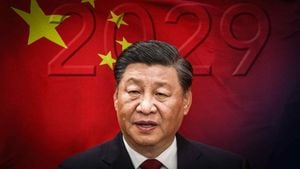Donald Trump’s recent return to the presidency has sparked lively discussions about the potential influences of tech moguls like Elon Musk. Musk, the CEO of SpaceX and Tesla, has voiced clear support for Trump over the years, and his newfound position as co-leader of the Department of Government Efficiency suggests his influence may funnel down to significant policy changes, particularly in areas like space exploration and technology regulation.
With the reinstatement of Trump, many speculate about what this powerful collaboration could mean for NASA and the broader space industry. Observers agree there will likely be cuts to the federal budget, and Musk, with his penchant for efficiency, could spearhead efforts to streamline NASA operations. This might result not only in cost reductions but also potentially transformative directions for missions, possibly focusing more on Mars than the Moon.
Experts predict the Trump administration’s approach may usher in changes to the Artemis program, which aims to return humans to the Moon by 2026. This initiative has already been plagued by significant delays and cost overruns, predicted to exceed $93 billion by 2025. The outcome could lean favorably toward the private sector, emphasizing partnerships with companies like Musk’s SpaceX, known for its rapid development cycles and innovative launches.
James Muncy, founder of PoliSpace, noted, "I think the Trump administration will want NASA to work with the private sector — to be bolder, vision-driven, and aggressive as they aim to return to the Moon and look toward Mars." This cooperative spirit may lead to significant adjustments within NASA to free missions from bureaucratic red tape, enabling faster advancements.
But the potential reforms extend beyond just space travel. Amanda Brock, CEO of OpenUK, suggested Musk’s influence could also reshape AI regulation significantly during Trump’s presidency. Musk’s history of advocating for deregulation raises questions about how these policies could evolve, especially when juxtaposed with existing stringent regulations within the UK and EU. Musk’s friendly rapport with Trump could spell significantly lighter regulations, impacting the development of open-source AI technologies and the larger tech ecosystem.
Yet, as Musk works to cement his influence, the competition within Trump’s cabinet is heating up. Musk is reportedly pressing Trump to appoint Howard Lutnick, whose ties to cryptocurrencies resonate with some of Trump’s promises surrounding economic renewal. This effort highlights Musk’s ambitions to embed his vision for tech innovation deeply within the government’s framework.
Interestingly, other Silicon Valley executives view Musk’s position differently. Aaron Levie, CEO of Box, encouraged Democrats to reevaluate their perceptions of Musk, advising, "If the party wants to win future elections and tackle challenges like housing shortages and technological development, they should get behind Musk’s new role." He believes collaborating with Musk could produce fruitful outcomes beneficial for both innovation and the electorate.
While the ambitions seem lofty, such rapid innovation must also grapple with the environmental and societal challenges inherent to technological breakthroughs. Levie highlighted the need for balance when it came to any relaxation of regulations, emphasizing the need to maintain environmental protections and social equity. The stakes are particularly high for projects involving sensitive ecological areas, where overhauls may inadvertently jeopardize animal habitats and broader environmental goals.
Reactions within the space industry are mixed. Some express optimism; others are cautious. Laura Forczyk from Astralytical noted, "It’s going to be interesting to see the regulatory process under the Trump administration. There might be some streamlining, especially concerning environmental impact statements; this will be the real test of Musk’s influence." There is palpable hope among many for the accelerated pace of progress, provided it occurs within a framework of responsible oversight.
Despite the uncertainty surrounding regulatory shifts, the transformative power of Musk's influence on Trump is undeniable. With Elon Musk steering certain trends within the Trump administration, the tech and space industries may see rapid advancements and dramatic shifts — all within the larger framework of redefined government efficiency.
This newfound collaboration holds promise for both private enterprises and public agencies. So whether it means the Mars mission might get expedited or regulations might lighten for AI technologies, the outcome will significantly influence the nation's future pathways.



